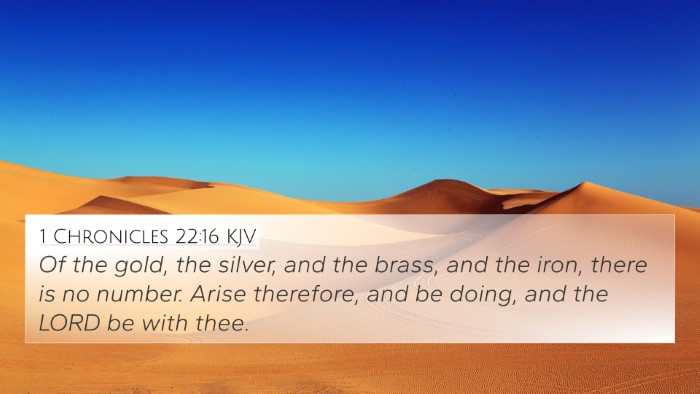Understanding 1 Kings 7:47
1 Kings 7:47 states: "And Solomon left all the vessels unweighed, because they were exceeding many: neither was the weight of the brass found out." This verse highlights a crucial aspect of the construction of the Temple and its furnishings—reflecting the abundance and grandeur dedicated to God.
Commentary Insights
Matthew Henry's Commentary
According to Matthew Henry, this verse indicates the overwhelming quantity of materials used in the sacred constructions undertaken by Solomon. The unweighted vessels symbolize God's boundless generosity and the immense resources David had accumulated for this divine project. It signifies that God’s blessings were beyond measurement, and the offerings made to Him should reflect His greatness.
Albert Barnes' Notes
Albert Barnes notes that Solomon’s decision not to weigh the vessels demonstrates both the magnitude of Solomon’s wealth and the overwhelming scale of the task at hand. It illustrates the idea that in context to godly projects, abundance and wealth are meant for God’s service and should be done with a sense of immeasurable gratitude, underlining the excessiveness of God’s presence in the endeavor.
Adam Clarke's Commentary
Adam Clarke remarks that the unweighed vessels pose a reflection on the significance placed on divine work, emphasizing the symbolic value of the brass materials, which often signifies strength and endurance in Biblical texts, thus hinting that the service rendered to God should be mighty and fortified, undeterred by limitations.
Thematic Connections
This verse opens up various thematic discussions and can be cross-referenced within the broader context of scriptural teachings. Below, we outline some relevant Bible verse connections and cross-references:
- 2 Chronicles 4:18-22: Chronicles highlights the detailed accounting of the vessels made for the temple, contrasting with the unmeasured abundance seen in 1 Kings 7:47.
- 1 Chronicles 29:2-3: David's preparation for the temple emphasizes the wealth and the heart response required for divine service, echoing Solomon's efforts.
- Exodus 35:29: Refers to the Israelite's willing spirit and willingness to contribute gold, silver, and brass for the construction of the Tabernacle, indicating a repeated theme of generosity.
- Philippians 4:19: Connects God's provision for our needs, paralleling the sufficient supply of resources for temple work.
- 1 Corinthians 3:12-13: Discusses building on the foundation laid in Christ, reflecting how sacred constructions serve a purpose beyond mere physical structures.
- Isaiah 60:17: Speaks of exchanging iron for gold, which aligns with the heavenly rewards of earthly labor performed for God’s glory.
- Matthew 25:14-30: The parable of the talents illustrates God's expectation that His resources are maximized for His purposes, mirroring Solomon's abundance.
Cross-Referencing Biblical Texts
This verse not only illustrates Solomon’s dedication to building the Temple but also serves as a reminder that all good and perfect gifts come from God, who could be relied upon for all provisions needed. Here are ways to engage with these themes:
- Tools for Bible Cross-Referencing: Utilize tools like Bible concordances to find connecting themes.
- Cross-Reference Bible Study: Engage in a effective cross-reference Bible study to deepen understanding.
- Bible Reference Resources: Look for resources that help in cross-referencing verses across both Old and New Testaments.
- Comparative Bible Verse Analysis: Analyze parallels such as this verse with other verses to understand broader topics.
Conclusion
1 Kings 7:47 serves as a tremendous reminder of the awe and reverence associated with God's house and the offerings made to Him. It encourages believers to reckon the infinite blessings received, propelling them towards generous actions in their lives in alignment with God's purposes. The connections made through cross-referencing aid in the complete understanding of scriptural themes and the broader narrative of the Bible.






